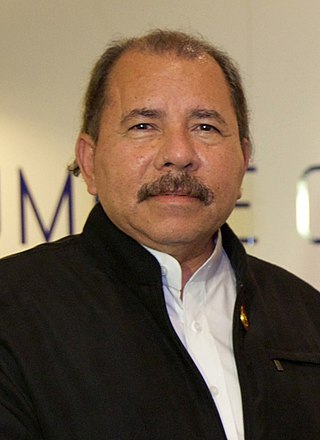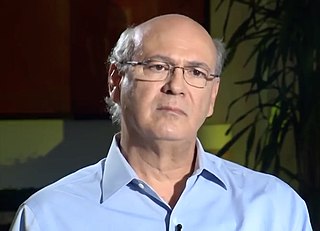
José Daniel Ortega Saavedra is a Nicaraguan politician who has been the 58th President of Nicaragua since 2007. Previously he was leader of Nicaragua from 1979 to 1990, first as Coordinator of the Junta of National Reconstruction from 1979 to 1985, and then as the 54th President from 1985 to 1990. During his first term, he implemented policies to achieve leftist reforms across Nicaragua. In later years, Ortega's left-wing radical politics cooled significantly, leading him to pursue pro-business policies and even rapprochement with the Catholic Church. However, in 2022, Ortega resumed repression of the Church, and has imprisoned prelate Rolando José Álvarez Lagos.
Freedom of the press or freedom of the media is the fundamental principle that communication and expression through various media, including printed and electronic media, especially published materials, should be considered a right to be exercised freely. Such freedom implies the absence of interference from an overreaching state; its preservation may be sought through the constitution or other legal protection and security. It is in opposition to paid press, where communities, police organizations, and governments are paid for their copyrights.

Reporters Without Borders is an international non-profit and non-governmental organization focused on safeguarding the right to freedom of information. It describes its advocacy as founded on the belief that everyone requires access to the news and information, in line with Article 19 of the Universal Declaration of Human Rights that recognises the right to receive and share information regardless of frontiers, along with other international rights charters. RSF has consultative status at the United Nations, UNESCO, the Council of Europe, and the International Organisation of the Francophonie.
La Prensa is a Nicaraguan newspaper, with offices in the capital Managua. Its current daily circulation is placed at 42,000. Founded in 1926, in 1932 it was bought by Pedro Joaquín Chamorro Zelaya, who had become editor-in-chief. He promoted the Conservative Party of Nicaragua and became a voice of opposition to Juan Bautista Sacasa, for which the paper was censored. He continued to be critical of dictator Anastasio Somoza García, who came to power in a coup d'état.
The working conditions of journalists in Algeria have evolved since the 1962 independence. After 1990, the Code of Press was suppressed, allowing for greater freedom of press. However, with the civil war in the 1990s, more than 70 journalists were assassinated by terrorists. Sixty journalists were killed between 1993 and 1998 in Algeria.
Censorship in Israel is officially carried out by the Israeli Military Censor, a unit in the Israeli government officially tasked with carrying out preventive censorship regarding the publication of information that might affect the security of Israel. The body is headed by the Israeli Chief Censor, a military official appointed by Israel's Minister of Defense, who bestows upon the Chief Censor the authority to suppress information he deems compromising from being made public in the media, such as Israel's nuclear weapons program and Israel's military operations outside its borders. On average, 2240 press articles in Israel are censored by the Israeli Military Censor each year, approximately 240 of which in full, and around 2000 partially.

Censorship in Venezuela refers to all actions which can be considered as suppression in speech in the country. More recently, Reporters Without Borders ranked Venezuela 159th out of 180 countries in its World Press Freedom Index 2023 and classified Venezuela's freedom of information in the "very difficult situation" level.

The disappearance of María Esther Aguilar Cansimbe happened 11 November 2009 when the female newspaper journalist who worked for El Diario de Zamora and El Cambio de Michoacán in Michoacán, Mexico vanished. Her disappearance may or may not be linked to her coverage of the Mexican Drug War but both Article 19 and Reporters Without Borders, two international press freedom organizations, have classified her disappearance as an act of enforced disappearance.

The protests against Daniel Ortega were a series of protests against President of Nicaragua Daniel Ortega and actions performed by his government, the dismantling of the opposition, and violence against peaceful protesters. The protests began in 2014, when the construction of the Nicaragua Canal was about to begin, and several hundred protesters blocked roads and clashed with police during the groundbreaking of the canal. Tens of thousands of Nicaraguans began to protest against President Ortega for what they believe to be a corrupt electoral system.
Freedom of the press in Honduras began with the government of Francisco Morazán as president of the Federal Republic of Central America in 1830, when he enacted the liberal reforms that included reforms to education, freedom of the press, and freedom of religion.

The 2018 Nicaraguan protests began on 18 April 2018 following a move by the government of Daniel Ortega to reform social security. Following the deaths of protesters, demonstrations intensified and grew into a large anti-Ortega movement seeking his removal from office.

Carlos Fernando Chamorro Barrios is a Nicaraguan independent investigative journalist. He is the founder and editor of Confidencial, a news website and weekly publication combining investigative journalism and analyses of current affairs. He also hosts two television news shows, Tonight and This Week. Chamorro is the youngest son of former president of Nicaragua Violeta Barrios de Chamorro and Pedro Joaquín Chamorro Cardenal, a Nicaraguan journalist and editor of La Prensa who was shot to death in January 1978 during the Somoza regime.

The 2018 Nicaraguan protests began on 18 April 2018 when demonstrators in several cities of Nicaragua began protests against the social security reforms decreed by President Daniel Ortega that increased taxes and decreased benefits. After five days of unrest in which nearly thirty people were killed, Ortega announced the cancellation of the reforms; however, the opposition has grown through the 2014–2018 Nicaraguan protests to denounce Ortega and demand his resignation, becoming one of the largest protests in his government's history and the deadliest civil conflict since the end of the Nicaraguan Revolution. On 29 September 2018, political demonstrations were declared illegal by President Ortega.

Lucía Pineda Ubau is a Nicaraguan journalist. She is the news director of Canal 15 in Nicaragua.

Human rights in Nicaragua refer to personable, political and social rights granted to every human in Nicaragua. Nicaragua derives its understanding of human rights from the Constitution of Nicaragua and international law. Nicaragua is a member state of the United Nations which states that fundamental human rights, such as freedom from slavery and freedom of expression, are enabled for all human beings without discrimination.

General elections were held in Nicaragua on 7 November 2021 to elect the President, the National Assembly and members of the Central American Parliament.

Cristiana Chamorro Barrios is a Nicaraguan journalist, nonprofit executive and political candidate. Vice-president of La Prensa, she was an aspiring presidential candidate in the 2021 Nicaraguan general election until the Ortega government disqualified her from running and ordered her arrest in early June 2021.

Jaime Chamorro Cardenal was a Nicaraguan newspaper editor and publisher. A civil engineer by training, journalism was the family business, as his father owned the newspaper La Prensa. Chamorro joined La Prensa in 1974, where he worked for 47 years and served as publisher for 28, from 1993 until his death in 2021.
Carl David Goette-Luciak is an Austrian-American journalist. Carl contributed to media outlets such as British daily The Guardian and The Washington Post and was based in Nicaragua for three years.
This is a timeline of the 2020 Nicaraguan protests. It covers events from February to December 2020.













